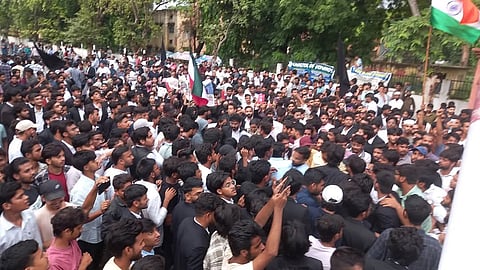
New Delhi- Sharjeel Imam, a jailed activist and former student leader, has voiced strong support for the ongoing protests at Aligarh Muslim University (AMU) against a significant fee hike, condemning the university administration and Uttar Pradesh Police for their response to the demonstrations. In a powerful letter from jail, Imam framed the fee increase as part of a deliberate effort to undermine AMU’s role as a bastion of accessible education and student activism, particularly for India’s Muslim community.
Imam, known for his role in the 2019 anti-Citizenship Amendment Act (CAA) protests, expressed unwavering solidarity with AMU students in a letter shared widely on social media. He recounted learning about the protests from a friend who visited him in jail, highlighting the “shameful use of force” by the AMU proctorial team and UP Police against peacefully protesting students on August 8. He described the administration’s decision to involve police as “an act of deliberate complicity,” accusing it of aligning with political forces to make AMU “inaccessible and politically docile.”
In his letter, Imam emphasized AMU’s historical significance as a courageous voice for Indian Muslims, recalling its leadership during the anti-CAA protests. "During the anti-CAA protests, AMU students were at the forefront, organizing with courage, articulating with clarity, and, on 15 December 2019, facing brutal state violence. I went to speak at AMU several times, and each visit sparked a rich exchange of ideas and perspectives. After my arrest, AMU students were the first to protest in my support. The university has long been a courageous voice of Muslims of India, and the state has never been comfortable with that" Imam wrote.
Imam framed the fee hike as part of a broader strategy to weaken student politics and exclude economically disadvantaged students. “Whether through suspending union elections, arbitrary disciplinary action, or financial barriers like this fee hike, the attempt is the same: to silence the free and courageous voice of this campus,” he stated. He criticized the administration of the minority institution for betraying its students and historical role in the community’s advancement, calling the fight for affordable education a “shared struggle” for all defending public education and dissenting spaces.
The protests at AMU, ongoing since August 6, were sparked by a 36-42% fee increase across various courses, including law, engineering, and humanities, effective for the 2025-2026 academic year. Students argue that the hike, which significantly raises costs for programs previously known for affordability, threatens access for those from economically weaker sections, particularly rural and minority communities. For many, the increase is seen as a move toward privatizing public education, undermining AMU’s mission to empower underprivileged youth.
The demonstrations, initially peaceful, included sit-ins at Bab-e-Syed Gate and a “Black Coat March” by law students. Tensions escalated on August 8 during Friday prayers, when UP Police, allegedly called by the AMU administration, used lathi charges and tear gas to disperse protesters, leading to injuries and detentions. Videos circulating on social media show police entering the campus and disrupting prayers, drawing comparisons to the 2019 anti-CAA crackdown.
Students demand a complete rollback of the fee hike, greater transparency in fee structures, and the reinstatement of the AMU Students’ Union, suspended since 2018. The protests have garnered support from figures like AIMIM chief Asaduddin Owaisi, former Union Minister Salman Khurshid, and student unions from Jawaharlal Nehru University and Delhi University. The administration has yet to announce a rollback, though dialogues may be underway.
As of August 11, protests continue peacefully, with students vowing to persist until their demands are met. The controversy has reignited debates on the affordability of public education and the autonomy of minority institutions in India.
You can also join our WhatsApp group to get premium and selected news of The Mooknayak on WhatsApp. Click here to join the WhatsApp group.